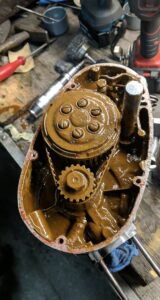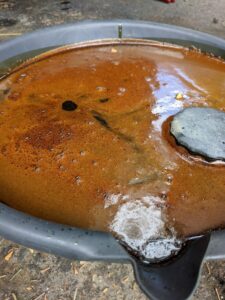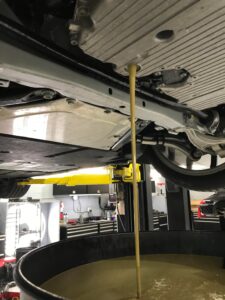Water in engine oil can be a serious problem for your vehicle. It can cause corrosion, damage to internal components, and decreased performance.
Whether you’ve driven through a deep puddle or your car has been sitting outside in the rain, it’s important to know how to remove water from your engine oil to ensure the health and longevity of your vehicle.
How to clean water in engine oil
If you suspect that you have water in your engine oil, it’s important to take action as soon as possible to remove it. Here’s how to clean water out of your engine oil:
- Drain the oil: First, drain the oil from the engine by removing the oil drain plug or oil pan. Collect the oil in a suitable container and discard it according to local regulations.
- Change the oil filter: Next, replace the oil filter. The oil filter can trap water, so it’s important to change it to ensure that all of the water is removed from the system.
- Refill with new oil: Once the oil is drained and the filter is changed, refill the engine with fresh oil. Be sure to use the correct grade and viscosity of oil for your vehicle, as specified in the owner’s manual.
- Check for leaks: After refilling the engine with fresh oil, start the vehicle and check for any oil leaks. If you notice any leaks, address them promptly to prevent water from entering the engine oil again.
By following these steps, you can effectively clean water out of your engine oil and keep your vehicle running smoothly. Regular oil changes and maintenance can help prevent water from entering the engine oil in the first place and ensure the health and longevity of your vehicle.
What happens if water gets in engine oil?
Water in engine oil can cause a number of problems for your vehicle. Some of the potential consequences of water in engine oil include:
- Corrosion: Water can cause corrosion on the internal components of the engine, leading to wear and damage.
- Reduced lubrication: Oil is designed to lubricate the internal components of the engine, helping to reduce friction and wear. Water can dilute the oil and reduce its lubricating properties, leading to increased wear on the engine.
- Decreased performance: Water in the engine oil can cause the engine to run poorly or not start at all.
- Increased risk of engine failure: Water in the engine oil can cause serious damage to the internal components of the engine, leading to decreased performance and an increased risk of engine failure.
Overall, it’s important to remove water from the engine oil as soon as possible to avoid these problems and ensure the health and longevity of your vehicle. Regular oil changes and maintenance can help prevent water from entering the engine oil in the first place.
Can I drive my car with water in the oil?
It is generally not recommended to drive your car with water in the oil. Water in the engine oil can cause serious damage to the internal components of the engine and lead to decreased performance and an increased risk of engine failure.
If you suspect that you have water in your engine oil, it’s important to take action as soon as possible to remove it. This may involve draining the oil, replacing the oil filter, and refilling the engine with fresh oil.
If you are unable to remove the water from the engine oil and continue to drive the vehicle, you risk causing serious and potentially costly damage to the engine. It’s generally best to avoid driving your car until the water has been properly removed and the engine oil has been replaced with fresh oil.
Overall, it’s important to address any issues with your engine oil as soon as possible to ensure the health and longevity of your vehicle. Regular oil changes and maintenance can help prevent water from entering the engine oil in the first place and ensure that your car is running smoothly.
How long will car run with water in oil?
It’s difficult to determine exactly how long a car will run with water in the oil, as it depends on various factors such as the amount of water present, the type of engine, and the driving conditions. In general, the longer you run a car with water in the oil, the more likely it is to cause damage to the engine and result in decreased performance or engine failure.
If you suspect that you have water in your engine oil, it’s important to take action as soon as possible to remove it. This may involve draining the oil, replacing the oil filter, and refilling the engine with fresh oil.
If you are unable to remove the water from the engine oil and continue to drive the vehicle, you risk causing serious and potentially costly damage to the engine. It’s generally best to avoid driving your car until the water has been properly removed and the engine oil has been replaced with fresh oil.
Overall, it’s important to address any issues with your engine oil as soon as possible to ensure the health and longevity of your vehicle. Regular oil changes and maintenance can help prevent water from entering the engine oil in the first place and ensure that your car is running smoothly.
How do you know if water has entered your engine?
There are a few signs that you can look for to determine if water has entered your engine:
- Cloudy or milky appearance of the oil: If the oil appears cloudy or milky, it could be an indication that water has entered the engine.
- White or brown foam on top of the oil: When you check the dipstick, you may notice white or brown foam forming on top of the oil. This could be an indication of water in the engine.
- Water droplets on the underside of the oil filler cap: If you notice water droplets forming on the underside of the oil filler cap, it could be an indication that water has entered the engine oil.
If you notice any of these signs, it’s important to take action as soon as possible to remove the water from the engine oil. Ignoring the problem can lead to serious damage to the engine and decreased performance.
To determine if water has entered your engine, it’s a good idea to regularly check the oil level and condition, and to have your vehicle inspected by a mechanic if you suspect any issues. Regular oil changes and maintenance can also help prevent water from entering the engine oil in the first place and ensure that your car is running smoothly.
How long does it take for water to mess up a car?
It’s difficult to determine exactly how long it takes for water to cause problems for a car, as it depends on various factors such as the amount of water present, the type of engine, and the driving conditions. In general, the longer a car is exposed to water, the more likely it is to cause damage and result in decreased performance or engine failure.
Water can cause a number of problems for a car, including corrosion, reduced lubrication, and decreased performance. If water enters the engine oil, it can dilute the oil and reduce its lubricating properties, leading to increased wear on the engine. Water can also cause corrosion on the internal components of the engine, leading to wear and damage.
If you suspect that your car has been exposed to water, it’s important to take action as soon as possible to minimize the risk of damage. This may involve draining the oil, replacing the oil filter, and refilling the engine with fresh oil. It’s also a good idea to have your car inspected by a mechanic to ensure that it is running smoothly and to address any issues that may have been caused by the water.
Overall, it’s important to take steps to protect your car from water exposure and to address any issues as soon as possible to ensure the health and longevity of your vehicle.
Will water evaporate out of engine oil?
Water is less dense than engine oil, so it will generally rise to the top of the oil and form a layer on top. In some cases, this water may evaporate over time, especially if the engine is run and the oil is heated. However, it’s not a reliable way to remove water from engine oil, as it may take a long time for the water to evaporate and the engine could be damaged in the meantime.
If you suspect that you have water in your engine oil, it’s important to take action as soon as possible to remove it. This may involve draining the oil, replacing the oil filter, and refilling the engine with fresh oil.
By removing the water from the engine oil, you can help prevent corrosion, damage to internal components, and decreased performance. Regular oil changes and maintenance can also help prevent water from entering the engine oil in the first place and ensure that your car is running smoothly.
Overall, it’s not recommended to rely on evaporation as a way to remove water from engine oil. It’s important to take steps to remove the water as soon as possible to minimize the risk of damage to the engine.
Wrapping Up
In conclusion, water in engine oil can be a serious problem for your vehicle. It can cause corrosion, damage to internal components, and decreased performance. If left untreated, water in engine oil can lead to costly repairs and shorten the lifespan of your vehicle.
Overall, it’s important to address any issues with your engine oil as soon as possible to ensure the health and longevity of your vehicle. By keeping your engine oil clean and free of water, you can help keep your car running smoothly and avoid costly repairs.
Other cleaning guides



